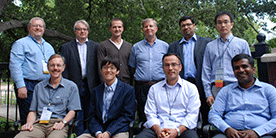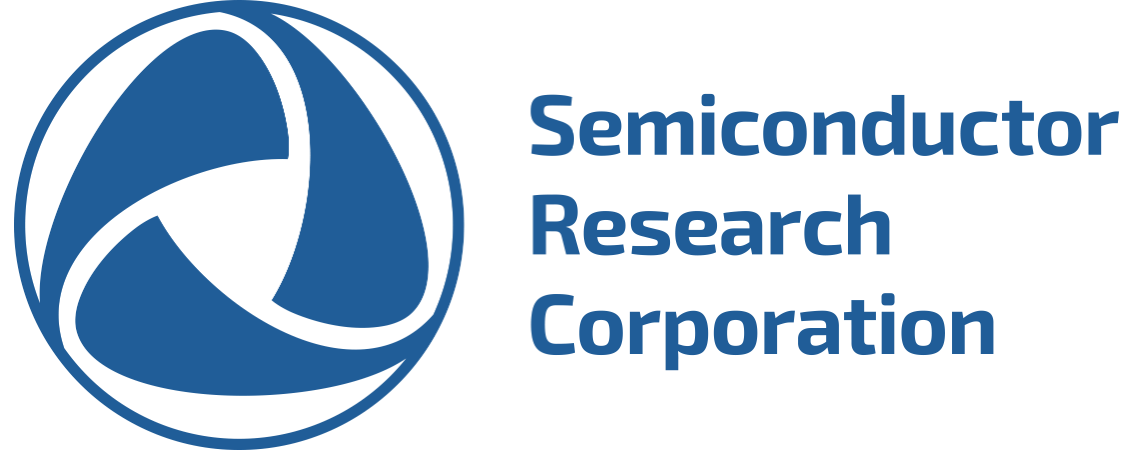 2013 Mahboob Khan Award winners at TECHCON 2013
2013 Mahboob Khan Award winners at TECHCON 20132013 Mahboob Khan Outstanding Liaison Award Winners
 2013 Mahboob Khan Award winners at TECHCON 2013
2013 Mahboob Khan Award winners at TECHCON 2013[Note: The following is the presentation of the 2013 Mahboob Khan Outstanding Liaison Awards by Dr. Celia Merzbacher, SRC Vice President Innovative Partnerships, at TECHCON 2013.]
The Liaison Program captures the essence of SRC. It brings together faculty researchers, graduate students, post-docs, and technical experts from the SRC member companies and provides for interactions that benefit all. The Liaisons, who are at the heart of the program, have three roles. They provide input and feedback on the research throughout the project. They act as mentors to students. And they facilitate technology transfer back to their company.
The Liaison Program was launched in 1983. It was so successful that similar programs are also part of STARnet (formerly FCRP), NRI and ERI. To date, there have been 3635 Liaisons, and today there are 703 individuals participating.
While SRC strives to make the program run smoothly, it is really the liaisons who make it work. The Mahboob Khan Outstanding Liaison Award, named in memory of a long-time Liaison program advocate from AMD, is presented to those individuals who have made significant contribution to the SRC community in their roles as Liaisons. Many Liaisons fulfill their responsibilities admirably. But some go above and beyond.
As I read the nominations, I was struck by how many mention that the awardee established regular meetings—often weekly—thereby becoming part of the research team. The result is countless co-authored papers, internships, and job offers! But perhaps the most valuable result is “relationships”, many of which last long after the project is done and the students are graduated.
This year we recognize 20 of the more than 700 liaisons. It gives me great pleasure to present the 2013 Mahboob Khan Outstanding Liaison Awards.
Richard Antley, Texas Instruments, was nominated by University of Alabama Professor Bruce Kim and (student) Sukeshwar Kannan. Mr. Antley’s deep knowledge of high voltage testing, and his willingness to provide access to data, samples and test equipment, was enormously beneficial to the project. His intimate involvement led to more than 10 co-authored papers.
Henning Braunisch, Intel, was nominated by Professor Dan Jiao at Purdue. Dr. Braunisch is affiliated with the Components Research of Intel Corporation. Dr. Braunisch facilitated knowledge transfer to industry; and enabled benchmarking against industry standards. He was an outstanding mentor and also served as reference for student applications for permanent residence in the US and advised on them on job opportunities.
Roman Caudillo, Intel, was nominated by Georgia Tech Professor Andrei Fedorov and (students) Dhaval Kulkarni and Songkil Kim. Roman not only served as an advisor to the research through regular telecons, he helped the team obtain high quality graphene samples. His mentoring resulted in one of the students (Dhaval Kulkarni) to take a job at Intel upon graduation.
Seung-Hyun Chae, Texas Instruments, was nominated by UT-Austin Professor Paul Ho and (student) Yiwei Wang. Seung-Hyyun became a TI Liaison after graduating from Prof. Ho’s group. So the relationships were already in place. Nevertheless, Seung-Hyyun worked to align the project with industry needs. As a result, the research not only advanced basic understanding of solder reliability but also developed metrology that is useful for the industry.
Eli Chiprout, Intel, was nominated by Dr. Robert Nguyen at Intel, Professor Li-C. Wang at UC Santa Barbara and (student) Vinayak Kamath. He works with the students regularly and jointly supervises one the PhD students. His extensive knowledge is a key resource to guide the research to align with the needs of SRC companies. His effort to promote technology transfer enables wide awareness and acceptance of the research. He’s played extensive roles in developing the workforce, aligning research as well as technology transfer from the university community to the industrial community.
Sagnik Dey, Texas Instruments, was nominated by Berkeley Professor Chenming Hu, his student Sriramkumar Venugopalan, and postdoc researcher Navid Paydavosi. Professor Hu noted, “Sagnik was instrumental in the modeling of important behaviors of advanced MOSFETs that we would not have known or been able to model without his help.” The model improvements developed with Sagnik’s help are incorporated in the next generation of BSIM, BSIM6, which will benefit not only TI, but the industry as a whole.
Doug Garrity, Freescale, was nominated by Professors Jose Silva-Martinez, Gabor Temes, Randall Geiger, and (students) Alexander Edward, Hemasundar Mohan Geddada and Kyehyung Lee. Doug was dedicated to keeping the research (which involved researchers at Texas A&M, Iowa State Univ. and Oregon State Univ.) focused on industry needs. In addition to being personally involved, Doug helped connect the researchers to others at Freescale, for example, organizing a short course by Prof. Silva-Martinez at the Freescale facility in Guadalajara. Doug’s impact on this project is even more impressive given that he is Liaison to 6 GRC projects.
Ajey Jacob, GLOBALFOUNDRIES, was nominated by a large group of professors and students from the NRI WIN Center. Dr. Jacob was an assignee to the WIN Center for 6 years. He not only engaged actively in the research, but also was instrumental in building relationships among the Center’s many academic institutions and member companies and between WIN and other FCRP Centers.
Jungwoo Joh, Texas Instruments, was nominated by Professor Jesus A. del Alamo and (student) Donghyun Jin at MIT for his involvement, continuous support and outstanding mentorship with SRC Project 2162 titled “Electrical Reliability of GaN FETs for Switching Power Applications”.
Rajiv V. Joshi, IBM, was nominated by Dr. Niraj K. Jha at Princeton, Dr. Ajay N. Bhoj at Intel and (student) Debajit Bhattacharya. Dr. Joshi made several excellent contributions to FinFET circuit research in our group and has been instrumental in transferring the technology to IBM. As a mentor, he is said to be very polite, enthusiastic and knowledgeable individual who is very passionate about electrical engineering and collaborative work.
Sharad Kumar, Freescale, was nominated by Marie Burnham, Professor Subhasish Mitra and (student) David Lin at Stanford. Sharad manages validation and post-silicon debug for Freescale from the New Delhi, India Design Center. In addition to ably fulfilling the roles of a liaison, he is now helping others in India to start on projects with US professors and is putting the “global” in Global Research Collaboration.
Loganathan Lingappan, Intel, was nominated by Virginia Tech Professor Michael Hsiao and (student) Sarvesh Prabhu. Dr. Lingappgan arranged internships for a number of the students involved with the project, which were critical both to the tech transfer process and in guiding the students’ research direction—as well as providing hands-on industry experience.
Gabriel Loh, AMD, was nominated by Professor Onur Mutlu and (students) Kevin Chang, Lavanya Subramanian and Rachata Ausavarungnirun at CMU. Weekly meetings have helped to build the relationship between Gabriel and the researchers. He provides strong mentorship to students in both technical and non-technical areas, including writing and presentation skills. As evidence of the collaborative nature of the liaison relationship, Gabriel has co-authored multiple papers with members of Professor Mutlu’s team.
Steve Palosh and Puneet Sharma, Freescale, were jointly nominated by CMU Professor Shawn Blanton and (student) Ankush Kochhar. Steve and Puneet provide equally important and complementing expertise. Together they facilitated the execution of a nondisclosure agreement between Carnegie Mellon and Freescale. That enabled the collection (by a CMU student intern) and sharing of company data that have been critical to the project.
Rubin Parekhji, Texas Instruments, was nominated by Professor Krishnendu Chakrabarty or his collaboration, significant contributions, and outstanding mentorship with SRC Project 1992 titled “Optimization of Test and Diagnosis Infrastructure for Multicore Chips”.
Ilko Schmadlak, Freescale, was nominated by Georgia Tech Professor Suresh Sitaraman and (student) Sathyanarayanan “Sathya” Raghava. Ilko provided guidance through regular conference calls, which were scheduled during business hours for Ga Tech researchers and Freescale engineers in TX and AZ—but were at 9PM where he was in Germany! Ilko help to secure a 6-month internship at Freescale for Sathya in 2012 that was important for his (Sathya’s) professional development and in transferring the technical results.
Friedrich Taenzler, Texas Instruments, was nominated by University of Alabama Professor Bruce Kim and (student) Sukeshwar Kannan. Dr. Taenzler coordinates interactions with various members of the technical staff at TI. His strong interactions have led to 15 co-authored papers. His support and mentoring of Sukeshwar led him to obtain a position at another GRC company, GLOBALFOUNDRIES.
Ian Young and Dmitri Nikonov, Intel, were jointly nominated by Professor Alan Seabaugh at Notre Dame, Professor Suman Datta at Penn State and Tom Theis and Jeff Welser at IBM for outstanding leadership in the implementation of a uniform methodology for benchmarking emerging device technologies in the Nanoelectronics Research Initiative (NRI). Ian’s statement to the university investigators that “Benchmarking is a tool, not a weapon” fostered trust and assuaged fears that the benchmarking would be used to streamline (aka “kill”) projects in the NRI program. In fact, the benchmarking effort has fostered a spirit of innovation among NRI researchers, while providing valuable data. Plans are underway to expand application of the benchmarks beyond NRI.
In closing— what comes through in each of the nominations is how much the faculty and students value the time and effort that each of you made not just to “track” but to “guide” the research and to foster the development of the next generation of semiconductor engineers and scientists. On behalf of the students, the researchers, and SRC—congratulations and thank you.


